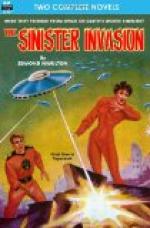Lockley opened the car door and got out quietly. Jill did not waken. He visited the chicken house, and horrendous squawkings came out of it. He found eggs. He went to the house, stepping gingerly from grass patch to grass patch, avoiding the puddles between them. He found bread, jars of preserves and cans of food. He inspected the lane. The car’s tracks had been washed out. He nodded to himself.
He went back to the barn. There was still only dusky half-light. He pulled the doors almost shut behind him, leaving only a four-inch gap to see through. Now the car was safely out of sight and there was no sign that any living being was near.
“You closed the doors,” said Jill. “Why?”
He said reluctantly, “I’m afraid we’re as badly off as we were at the beginning. Unless I’m mistaken, we got turned around in that rainstorm on those twisty roads, and the Park begins nearby. This isn’t the highway I drove up on to find you, the one where my car’s wrecked. This is another one. I don’t think we’re more than twenty miles from the Lake, here. And that’s something I didn’t intend!”
He began to unload his pockets.
“I got something for us to eat. Well just have to lie low until night and fumble our way out toward the cordon, with the stars to guide us.”
There was silence, save for the lessened dripping of water. Lockley was filled with a sort of baffled impatience with himself. He felt that he’d acted like an idiot in trying to escape the evacuated area by car. But there’d been nothing else to do. Before that he’d stupidly been unsuspicious when the Wild Life truck came down a highway that he’d known was blocked by a terror beam. And perhaps he’d been a fool to refuse to discuss why he’d gone up to the construction camp to see to her safety when by all the rules of reason it was none of his business.
The gray light paled a little. Through the gap between the barn doors, he could see past the house. Then he could see the length of the lane and the trees on the far side of the highway.
He was laying out the food when suddenly he froze, listening. The stillness of just-before-dawn was broken by the distant rumble of an internal-combustion engine. It was a familiar kind of rumbling. It drew nearer. Except for the singularly distinct impacts of drippings from leaves and roof to the ground below, it was the only sound in all the world.
It became louder. Jill clenched her hands unconsciously.
“I don’t think there are any car tracks at the turn-off where we came in,” said Lockley in a level voice. “The rain should have washed them out. It’s not likely they’re looking for us here anyhow. But I’ve only got three bullets left in the pistol. Maybe you’d better go off and hide in the cornfield. Then if things go wrong they’ll believe I left you somewhere.”
“No,” said Jill composedly, “I’d leave tracks in the ploughed ground. They’d find me.”




